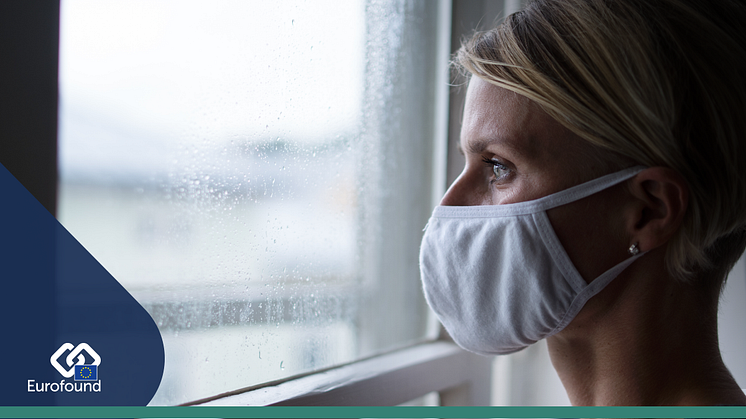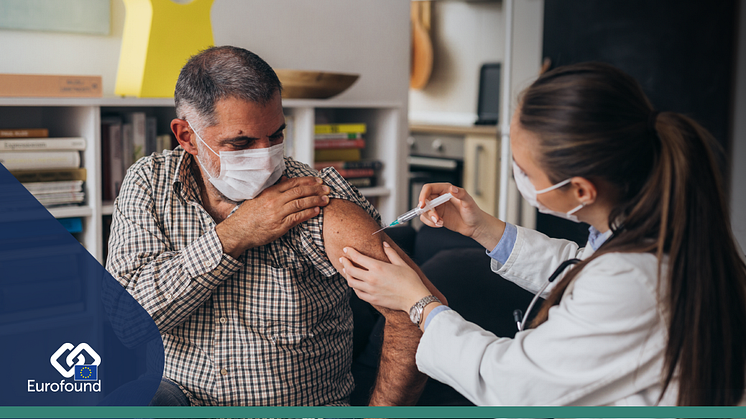
News -
Over a quarter of adults in EU indicate they are unlikely to take COVID-19 vaccine
Over a quarter (27%) of adults in the EU are vaccine hesitant, with 29% of men and 25% of women indicating that they were either ‘very unlikely’ or ‘rather unlikely’ to take the COVID-19 vaccine in Eurofound’s large-scale Living, working and COVID-19 online survey. Vaccine hesitancy was highest in Bulgaria, where 61% of those surveyed indicated they were very unlikely or rather unlikely to take the vaccine, and lowest in Denmark, Malta and Ireland, where less than 10% indicated they were very unlikely or rather unlikely to take it. The survey found a strong association between vaccine hesitancy and social media use, particularly when social media is the main source of information.
The third round of the e-survey, fielded in February and March 2021, sheds light on the social and economic situation of people across Europe following nearly a full year of living with COVID-19 restrictions. The report analyses the main findings and tracks ongoing developments and trends across the 27 EU Member States since the survey was first launched in April 2020.
The stated intention to get vaccinated varies considerably among Member States, with an important east–west divide discernible across the Union. With the notable exception of Austria and France, the intention to get vaccinated is over 60% for all western Member States – with Nordic and Mediterranean countries, Denmark and Ireland having even higher rates – while among eastern Member States the rate is dramatically lower, ranging from 59% in Romania to 33% in Bulgaria.
The report notes that people in the prime age group (aged 35–49 years) are more sceptical about vaccines (29%) than younger and older age groups (26% and 27%, respectively). Unemployed people (39%), those with a long-term illness or disability (39%) and full-time homemakers (33%) are more vaccine hesitant than people in employment (26%) or people who are retired (23%). The least vaccine averse are students (13%).
The time spent on social media and what type of media is used as the main news source has a large influence on vaccine hesitancy. While those that consume social media for three hours or more daily are slightly more hesitant (30%) than others (26%), the proportion rises to 40% among those who use social media as their primary source of news. Among those who use traditional news sources (press, television and radio) as their primary source of information, the proportion of vaccine sceptics is as low as 18%.
Speaking about the findings, Daphne Ahrendt, Eurofound Senior Research Manager, spoke about the importance of clear communication around the efficacy and safety of vaccines: ‘Vaccines play a crucial role in overcoming the COVID-19 pandemic. Unfortunately, these findings reflect a failure to deliver persuasive and clear communication regarding the efficacy and safety of vaccines. Trust in vaccines is related to trust in institutions, and this is an issue primarily for policymakers, but we also all have a collective responsibility, across society, to ensure that we communicate and publish accurate and sound information on the safety and importance of vaccines.’
Further information:
- Report: Living, working and COVID-19 (Update April 2021)
- Data: Vaccinations during COVID-19
- Topic page: COVID-19
Special #AskTheExpert webinar:
Daphne Ahrendt will present the latest findings from the Living, working and COVID-19 e-survey on 18 May. The LIVE webinar will be an opportunity to explore how EU citizens’ social, employment and economic situation has evolved during one year of closures and restrictions in the wake of COVID-19.
- Sign up now: #AskTheExpert webinar on 18 May 2021: EU citizens experience deep fatigue and frustration as pandemic enters second year - New survey findings from Living, working and COVID-19
* Updated 13 May noting vaccine hesitancy lowest in Denmark, Malta and Ireland











